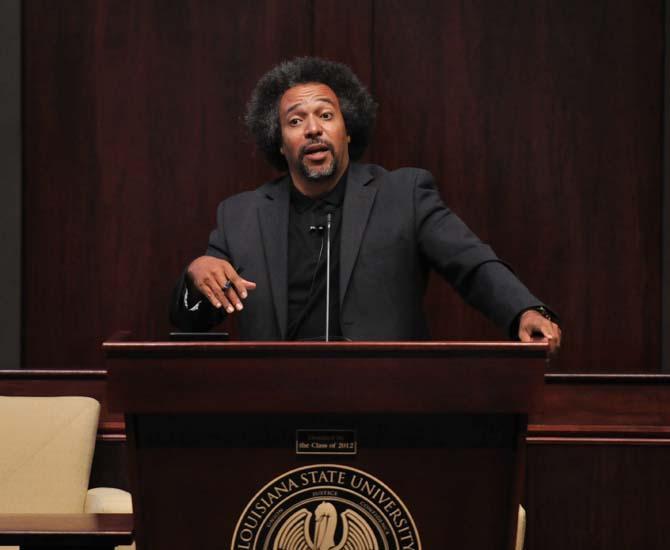Although the George Zimmerman trial is over, conversation about the case is far from finished.
The Paul M. Hebert Law Center hosted a panel discussion Thursday evening, where guests agreed the verdict was the result of underlying social problems.
The case, which alleged that 28-year-old Zimmerman was guilty of the fatal shooting of 17-year-old Trayvon Martin, exemplifies a new perspective on policing crime, according to Donald Tibbs, professor at the Drexel University Earl Mack School of Law.
While policing should begin with the crime, Tibbs said, today’s law enforcement starts with an idea of who the person committing the crime might be and aims to target a specific group of people for a certain type of crime.
Tibbs and attorney Lewis Unglesby, who helped defend Rodney Peairs in the infamous Hattori case, both guests on the panel, argued that the “Stand Your Ground” law in Florida — where the crime and trial took place — were also part of the problem.
Much of the conversation focused on the validity of Florida’s Stand Your Ground law, which is a type of self-defense law that gives individuals the right to use deadly force to defend themselves without any requirement to evade or retreat from a dangerous situation.
Unglesby said the problem with the Stand Your Ground law is that it considers the sidewalk as “ground.” When Zimmerman confronted Martin, neither his house nor any of his property was in danger. In fact, Zimmerman continued following Martin after the 911 dispatcher told him not to, Unglesby said.
“I remember hearing someone say ‘This case is not about race and not about guns,’” Unglesby said. “Well hell yes it is, it’s only about those two things. What else is it about? Children and lollipops and Skittles?”
The panelists went on to further discuss how the issue of race in the U.S. courts and in society was essential to this verdict.
“You know, people say the ‘Trayvon Martin case,’ which is not even a case really,” Tibbs said. “Because he was shot and killed in the street, but Zimmerman, he got a case.”
Unglesby said society likes to believe it’s less violent today than it was in the past, but the truth is society is more violent today than ever before.
Police become judges on the street and certain people are criminilaized before they are even noticed, Tibbs said.
“Policing is a profoundly cultural and psychological phenomenon; it is gratuitous and unwarranted,” Tibbs said. “Policing proceeds the law; it doesn’t follow it. Only in a society where the law puts black people as synonymous with crime, can this situation exist. Your image is left as the cause and problem to your own death.”
Tibbs said that the key to this entire process is racial profiling and how policing actually creates this profile.
“I think one of the tragedies in the U.S. is that we don’t talk about race ever in the courtroom,” Unglesby said.
Panel agreed Martin verdict displayed social problems
September 5, 2013
Associate Professor of Law at Earle Mack School of Law, Donald F. Tibbs, speaks on September 5, 2013, during the Trayvon Martin Panel in the McKernan Auditorium in the Paul M. Hebert Law Center. Also part of the panel were Associate Professor of LSU Law Ken Levy and lawyer Lewis Unglesby.





